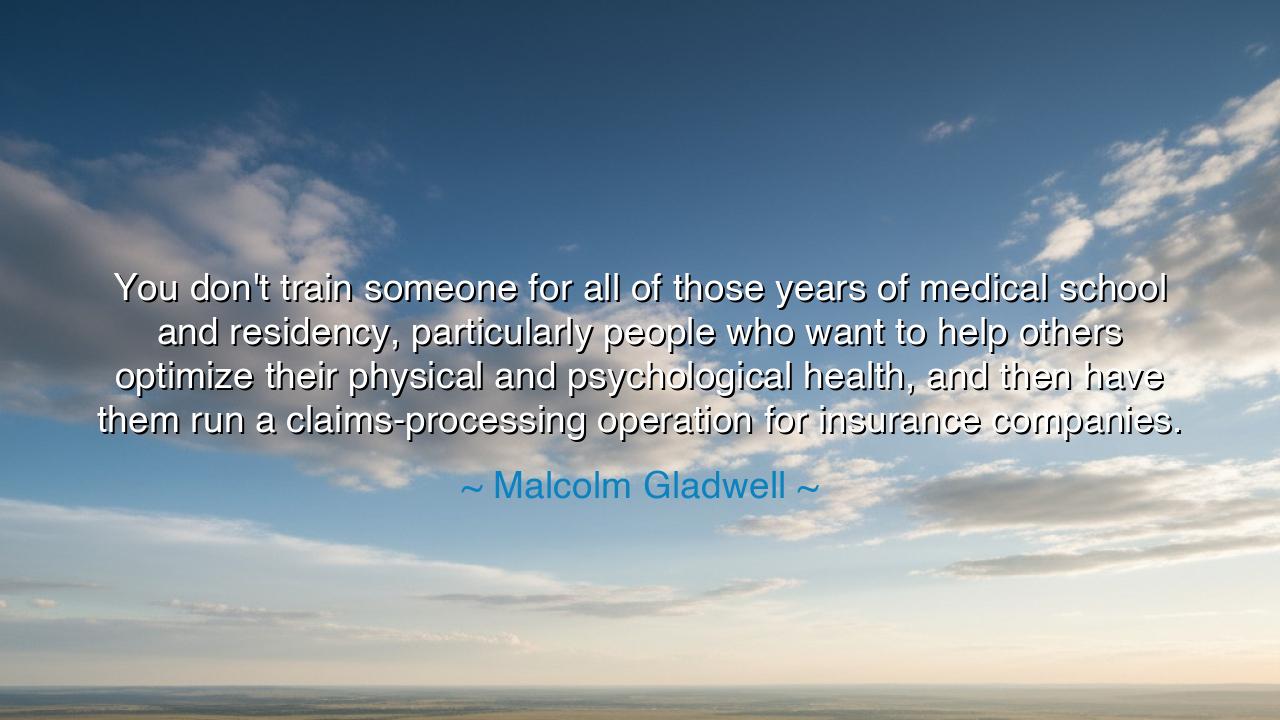
You don't train someone for all of those years of medical school
You don't train someone for all of those years of medical school and residency, particularly people who want to help others optimize their physical and psychological health, and then have them run a claims-processing operation for insurance companies.






The words of Malcolm Gladwell, when he declared, “You don't train someone for all of those years of medical school and residency, particularly people who want to help others optimize their physical and psychological health, and then have them run a claims-processing operation for insurance companies,” are a cry from the soul — a lament for a world that has forgotten its purpose. In this single sentence lies the tension between vocation and bureaucracy, between the noble calling of the healer and the cold machinery of the modern system. Gladwell speaks as a prophet among the ruins of efficiency, reminding us that to strip a healer of his sacred duty is to wound not just the doctor, but the very spirit of humanity.
In ancient times, the healer was revered as one who bridged the mortal and the divine. The Greeks spoke of Asclepius, who was taught by the centaur Chiron the art of restoring life and balance. His temples were sanctuaries where the sick came not to file claims or complete forms, but to be renewed in body and soul. The healer’s touch was guided by compassion, not commerce. To the ancients, medicine was not a business; it was a covenant of mercy. Gladwell’s words remind us that we have strayed far from that sacred covenant — that in our quest for order, we have shackled the very hands that were meant to heal.
The modern physician, trained through years of study, sleepless nights, and sacrifice, is meant to embody devotion to the human condition. Yet too often, they find themselves consumed not by the art of healing, but by the machinery of administration. Paperwork replaces pulse, forms replace empathy, and metrics replace miracles. Gladwell’s lament is thus both moral and spiritual: you cannot train one to heal and then command them to count and code, for it corrupts the essence of their purpose. The soul that was trained to mend flesh and soothe sorrow should not be enslaved by the ledgers of insurers. To do so is to commit a quiet heresy against the meaning of vocation itself.
Consider the story of Dr. Ignaz Semmelweis, the Hungarian physician who, in the 19th century, discovered that handwashing could prevent deadly infections among mothers in childbirth. Though his insight could have saved countless lives, his superiors dismissed him, for his discovery did not fit their bureaucratic norms. His pleas went unheard; his spirit broke. He died forgotten, though his truth later transformed medicine. Semmelweis was a man of vision, silenced by a system more loyal to its rules than to its reason. His tragedy is a mirror to Gladwell’s warning — that when we make systems the master and the human heart the servant, greatness withers.
Gladwell’s words also speak beyond medicine. They speak to every soul whose passion is buried beneath routine, whose purpose is lost to profit, whose inner fire has been dampened by endless procedure. Whether one is teacher, artist, builder, or caregiver — when one’s true calling is reduced to numbers, the spirit revolts. The ancients knew this truth well: that meaning must guide labor, or labor becomes slavery. Thus, to allow those who were born to heal to be turned into clerks is to dishonor the sacred gift of their calling — and to rob society of its moral compass.
The lesson, then, is this: do not let systems steal the soul of service. Whether you work in medicine or any other field, guard the spark that drew you to your craft. Remember why you began — the desire to heal, to help, to bring light into the lives of others. Systems may constrain you, but you must never let them define you. Where bureaucracy demands compliance, let compassion demand courage. Where rules dull the heart, let empathy sharpen it again.
So, my brothers and sisters, let Gladwell’s cry be your call to remembrance. Do not train the healer and make him a clerk. Do not train the teacher and make her a scribe. Do not train the dreamer and bind him to the desk. The world is built not by systems, but by souls. The ancients would have said it thus: “When the healer forgets healing, the world grows sick.” Therefore, take up your calling again — fiercely, faithfully, and without apology. Work not as a cog in the machine, but as a keeper of meaning, a guardian of the human spirit, and a servant of all that is still good and sacred in this world.






AAdministratorAdministrator
Welcome, honored guests. Please leave a comment, we will respond soon